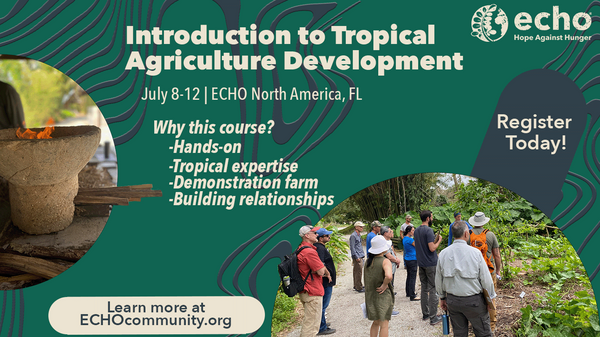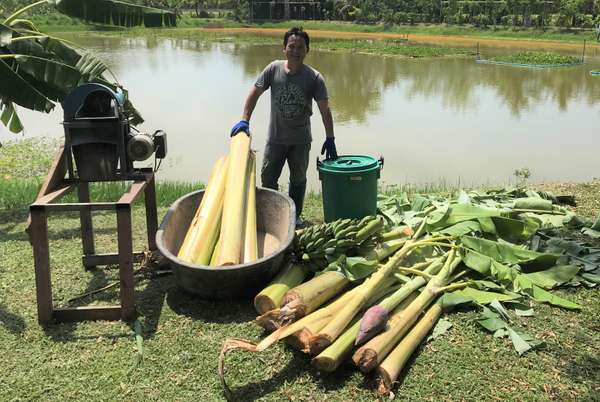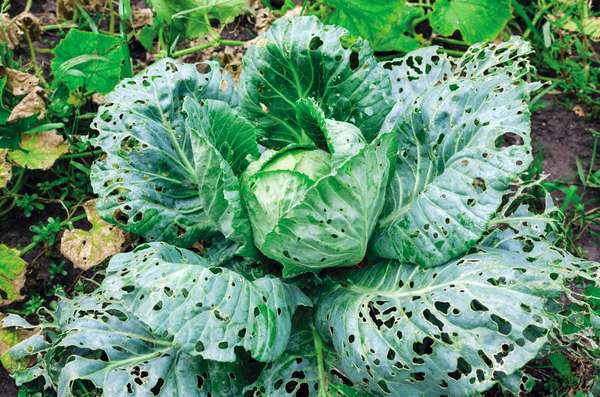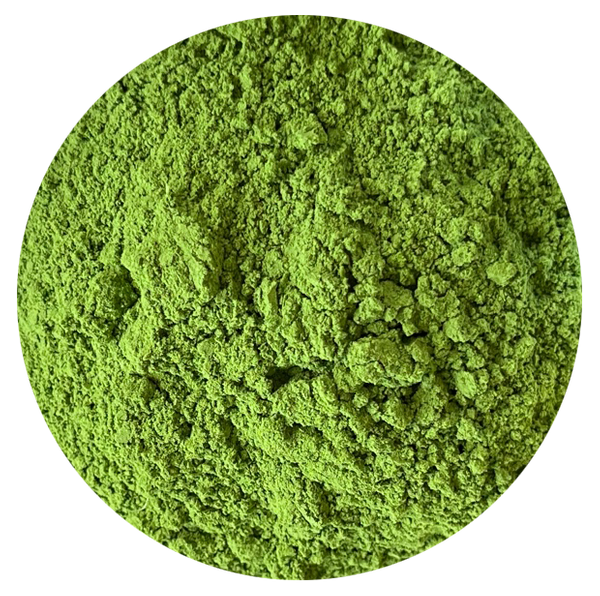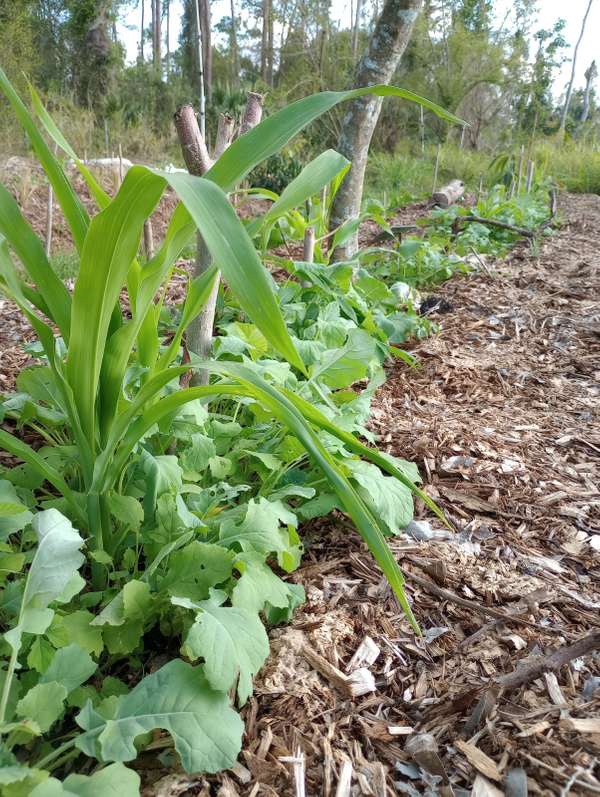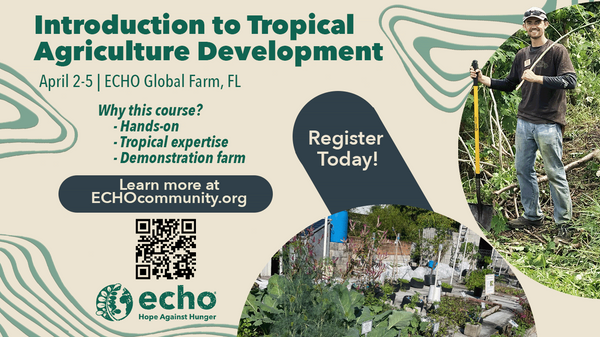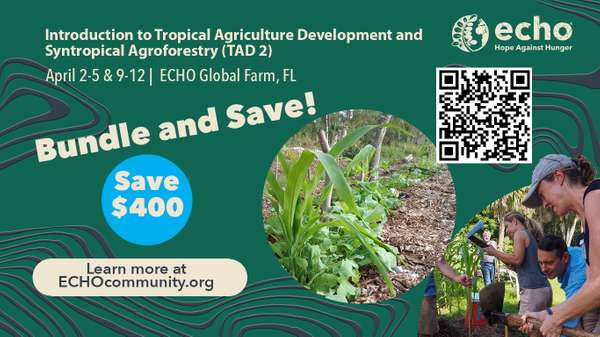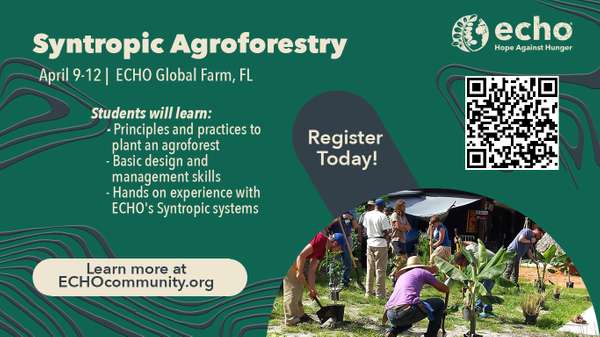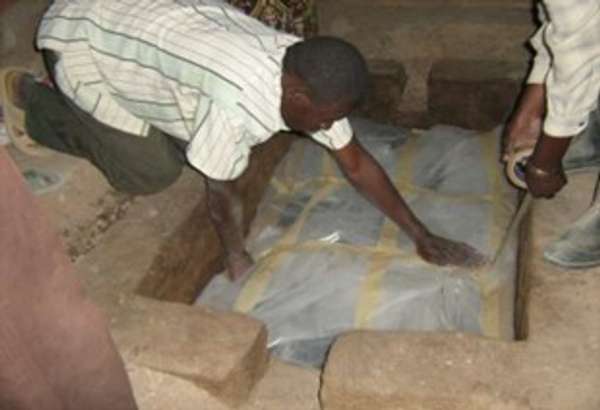ECHOcommunity อัปเดต
ECHO North America TAD 1 July 2024 2024-04-30
Have you registered for our next Introduction to Tropical Agriculture Development course yet? This course will be July 8-12 and will cover a broad range of topics concerning agriculture in tropical climates. Click the image below to get more information about the course and how to register online! Our Early Bird special rate is active until May 19th, then prices will go up. Don't wait, register today!
Banana stalk silage 2024-04-23
On-farm feeds are an important part of smallholder options for livestock management. Farmers without access to major feed materials like meals, bran, or mineral salts often have to rely on fodder-based nutrients and other on-farm feed options. One on-farm feed that is heavily used on the ECHO Asia and ECHO North America farms is banana stalk silage. Banana stalk silage is a fermented feed that can be used for pigs, ruminents, and even fowl. Fresh sliced or shredded banana stalks are mixed with sugar and coarse salt (at a ratio of 100 kg chopped stalks : 4 kg sugar : 1 kg rock salt) and fermented anaerobically (without oxygen) in a bucket. You can add nutrient-boosting ingredients like high-protein bran or fish meal to the completed product before feeding to livestock if you have access to them.
ECHO Library listings on ECHOcommunity - Conduct a Book Search Today! 2024-04-16
The Dick Dugger Living Library on the ECHO North America RIC campus is a collection of books supporting the mission of ECHO. We encourage those visiting ECHO in Florida to search out helpful information contained in the library. While books cannot be loaned out, titles, authors, Dewey numbers and ISBN references will help you find these books in other locations.
Those planning a visit to the ECHO Asia Regional Impact Center may wish to look through the list of books available in the ECHO Asia Library (noted by the presence of Asia Library shelf numbers)
We also list books that are not available at ECHO locations but may be useful for you to note.
Of the 6500 books listed, 450 are available as free digital downloads.
Links for purchasing books on Amazon or the ECHO online bookstore are noted when available.
Join the Conversation: Snail/Slug Control 2024-04-09
An ongoing ECHO Conversation has been happening around options for snail or slug control. Do you have experience in controlling snails or slugs in your garden? Please share your ideas and techniques! Have you had major issues dealing with snails or slugs in your garden? Check out techniques shared from ECHO's Global Network!
EDN #163 Now Available 2024-04-01
In this issue
- Harvesting and Drying Considerations for Quality Moringa Leaf Powder
- Echoes from our Network: Options for Snail Control
- From ECHO's Seed Bank: Jute Mallow ‘Thai‘
- Books, Websites, and Other Resources: ECHOcommunity Mobile App – Plant Records Tutorial
Harvesting and Drying Considerations for Quality Moringa Leaf Powder
Tim Motis
Excerpt:
Options for drying moringa leaves include shade-drying, drying in direct sunlight, solar drying, and drying in an oven or cabinet equipped with a heat source and fan(s). An ideal drying method will optimize factors like air movement, temperature, and light to dry moringa leaves with minimal loss of vitamins. Your drying method also needs to be practical. A drying cabinet with a heat source and fan provides high-level control of temperature and air circulation; however, it requires electricity. Shade-drying probably retains more nutrients than sun-drying, but there is the risk of mold under high ambient humidity.
Bundle and Save! Tropical Agriculture Development Courses discounted when you register for both! 2024-03-26
We are excited to announce that ECHO North America will be hosting a Tropical Agriculture Development Course 2 in April titled Syntropic Agroforestry. This course will cover the principles and practices needed for a beginner to plant their own agroforest. Basic design and management skills will also be taught. An attendee can expect to return home with enough knowledge to produce a couple of rows of trees, so they start learning more through firsthand experience. The Bundle is TAD 1 and 2 together in April!
Two-course cost: $1300 (savings up to $400!)
Syntropic Agroforestry Bundle and Save!
Until slots are full, ECHO is offering a special discounted rate for those who register for both courses at the same time! That's two information-packed weeks on the ECHO farm learning from experienced ECHO staff and Partners and interacting with a multitude of tropical crops, systems, and animals.
Annual Sugar Cane Harvest at ECHO North America Regional Impact Center 2024-03-19
Several weeks ago, we held our annual sugarcane harvest at the North America Regional Impact Center. Many staff and volunteers contributed to make for a successful 2024 harvest. Each year, this process provides interns, staff, and volunteers with the opportunity to learn how to turn raw sugarcane into a shelf-stable syrup. This year we harvested over 425 kg (938 lbs) of sugarcane which yielded 142 kg (313 lbs) of fresh juice by weight, or 134 L (35 gal) by volume. The 134 L of raw juice yielded 26.5 L (7 gal) of syrup.
While the process is relatively simple, it requires many hands when utilizing turn of the (20 th) century tools and techniques. First the sugarcane is harvested and washed, then it is pressed in a manual-powered cane mill. After the juice is collected, it is poured into a large cast iron cauldron. The juice is brought to a continuous boil and closely monitored as it slowly reduces to syrup. Upon reaching the target sugar content, the hot syrup is carefully bottled into glass jars.
Take a look at some pictures of the process!
ECHO North America TAD 1 April 2024 2024-03-12
Hurry and sign up to join us for our Introduction to Tropical Agriculture Development class at ECHO North America. Classes are April 2-5 for TAD I, if you would like to also join us the following week for TAD II: Syntropical Agroforestry (April 9-12) you can bundle and save! Click the links below for more information.
Upcoming TAD Event Opportunities in April 2024 at ECHO North America! 2024-03-05
Please join us at ECHO North America during one or both of our upcoming TAD Events. Use the links to find out more information and/or sign up for the events.
East Africa Note 12 Now Available! 2024-02-27
In this issue
- Symposium Shared Lessons, Technologies, and Experience
- Expand and Strengthen the ECHO East Africa Network Member
- Transformative Impact of Internships on Young Individuals
- Support the Mission of Work Through Partnership/Collaboration
- Upcoming Joint Symposium in Juba, South Sudan
Symposium Shared Lessons, Technologies, and Experiences
Harold Msanya
Excerpt:
Grain has been stored in underground pits in North Africa and the Middle East for thousands of years. It is currently a common practice in Sudan, Somalia and Ethiopia. While underground storage pits have been in use since ancient times, they are still relatively unknown, but can be an attractive option for many. Storage pits offer the advantages of relative easy construction, low relative cost, safety from theft, good thermal insulation, and protection from moisture, rodent attack and insect infestation.
